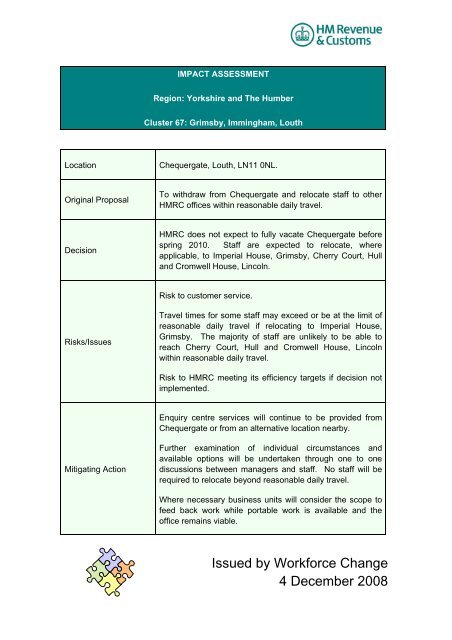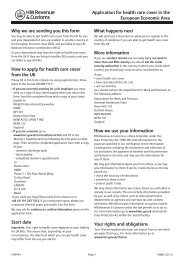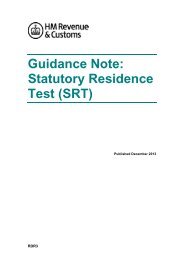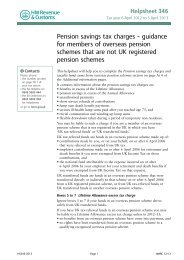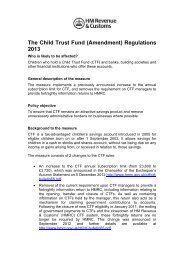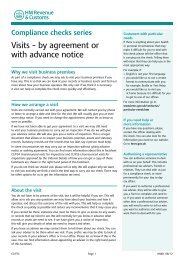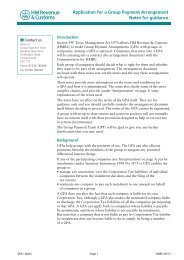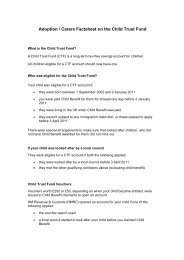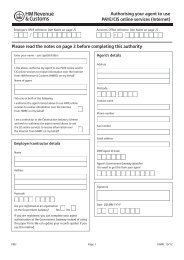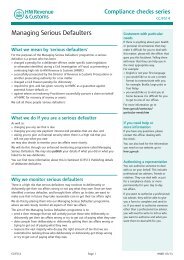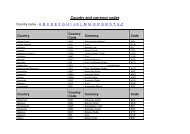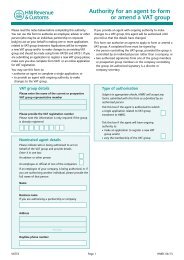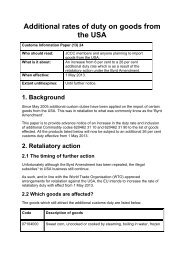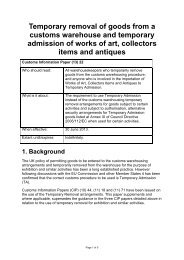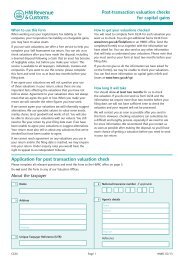Chequergate, Louth, (PDF 937K) - HM Revenue & Customs
Chequergate, Louth, (PDF 937K) - HM Revenue & Customs
Chequergate, Louth, (PDF 937K) - HM Revenue & Customs
Create successful ePaper yourself
Turn your PDF publications into a flip-book with our unique Google optimized e-Paper software.
IMPACT ASSESSMENT<br />
Region: Yorkshire and The Humber<br />
Cluster 67: Grimsby, Immingham, <strong>Louth</strong><br />
Location <strong>Chequergate</strong>, <strong>Louth</strong>, LN11 0NL.<br />
Original Proposal<br />
Decision<br />
Risks/Issues<br />
Mitigating Action<br />
To withdraw from <strong>Chequergate</strong> and relocate staff to other<br />
<strong>HM</strong>RC offices within reasonable daily travel.<br />
<strong>HM</strong>RC does not expect to fully vacate <strong>Chequergate</strong> before<br />
spring 2010. Staff are expected to relocate, where<br />
applicable, to Imperial House, Grimsby, Cherry Court, Hull<br />
and Cromwell House, Lincoln.<br />
Risk to customer service.<br />
Travel times for some staff may exceed or be at the limit of<br />
reasonable daily travel if relocating to Imperial House,<br />
Grimsby. The majority of staff are unlikely to be able to<br />
reach Cherry Court, Hull and Cromwell House, Lincoln<br />
within reasonable daily travel.<br />
Risk to <strong>HM</strong>RC meeting its efficiency targets if decision not<br />
implemented.<br />
Enquiry centre services will continue to be provided from<br />
<strong>Chequergate</strong> or from an alternative location nearby.<br />
Further examination of individual circumstances and<br />
available options will be undertaken through one to one<br />
discussions between managers and staff. No staff will be<br />
required to relocate beyond reasonable daily travel.<br />
Where necessary business units will consider the scope to<br />
feed back work while portable work is available and the<br />
office remains viable.<br />
Issued by Workforce Change<br />
4 December 2008
IMPACT ASSESSMENT<br />
Contents<br />
2<br />
Impact Assessment: <strong>Chequergate</strong>, <strong>Louth</strong><br />
1 SUMMARY ..................................................................................................... 3<br />
1.1. Background.................................................................................................. 3<br />
1.2. Enquiry Centre Customers........................................................................... 3<br />
1.3. Socio-economic............................................................................................ 3<br />
1.4. Staff.............................................................................................................. 3<br />
1.5. Staff Diversity ............................................................................................... 3<br />
1.6. Business Units ............................................................................................. 4<br />
1.7. Finance ........................................................................................................ 4<br />
2 OFFICE PROPOSAL AND BUSINESS PLANS............................................. 4<br />
2.1. Office Proposal............................................................................................. 4<br />
2.2. Business Plans............................................................................................. 4<br />
3 ENQUIRY CENTRE CUSTOMER IMPACT.................................................... 4<br />
3.1. Enquiry Centre Summary............................................................................. 4<br />
4 SOCIO-ECONOMIC IMPACT......................................................................... 5<br />
4.1. Member of Parliament and Constituency ..................................................... 5<br />
4.2. Local Economy............................................................................................. 5<br />
4.3. Sustainable Development ............................................................................ 5<br />
4.4. Media Activity ............................................................................................... 6<br />
4.5. External Engagement................................................................................... 6<br />
5 STAFF & STAFF DIVERSITY IMPACT.......................................................... 6<br />
5.1. Business Unit Headcount............................................................................. 6<br />
5.2. Staff Diversity ............................................................................................... 6<br />
5.3. Equality Impact Assessment ........................................................................ 7<br />
5.4. Staff Consultation......................................................................................... 7<br />
6 RELOCATION OPTIONS FOR STAFF .......................................................... 8<br />
6.1. Imperial House, Grimsby.............................................................................. 8<br />
6.2. Cherry Court, Hull ........................................................................................ 9<br />
6.3. Cromwell House, Lincoln ........................................................................... 10<br />
6.4. Daily Travel Assistance.............................................................................. 11<br />
6.5. Other Government Departments................................................................ 11<br />
7 ESTATES & FINANCE ................................................................................. 11<br />
7.1. Estate Information ...................................................................................... 11<br />
7.2. Finance ...................................................................................................... 12<br />
7.3. Information Management Services (IMS)................................................... 12<br />
APPENDIX A: EQUALITY IMPACT ASSESSMENT – CHEQUERGATE,<br />
LOUTH ........................................................................................ 13<br />
APPENDIX B: MAP OF OFFICES..................................................................... 24<br />
To receive this document in an alternative version please contact the Visually<br />
Impaired Media Unit on 01274 539 646 or e-mail VISUALLY IMPAIRED MEDIA<br />
UNIT, SHIPLEY (Accounts Office Shipley).
1 SUMMARY<br />
1.1. Background<br />
3<br />
Impact Assessment: <strong>Chequergate</strong>, <strong>Louth</strong><br />
<strong>HM</strong>RC proposes to rationalise its estate in the Yorks & Humber Region with the<br />
aim of making more effective and efficient use of office space and to integrate<br />
teams within and across business units. Whilst <strong>Louth</strong> is situated in the East<br />
Midlands Region, it has been reviewed alongside Cluster 67 in Yorks and<br />
Humber. As part of this proposal <strong>HM</strong>RC has reviewed its business requirement<br />
to remain at office buildings in Cluster 67. This cluster contains the office<br />
buildings in Grimsby, Immingham and <strong>Louth</strong>. The review has identified that there<br />
is no long term requirement to retain <strong>Chequergate</strong>, <strong>Louth</strong>.<br />
1.2. Enquiry Centre Customers<br />
Enquiry centre services will continue to be provided from <strong>Chequergate</strong> or from an<br />
alternative location nearby. The impact on customers is expected to be minimal.<br />
1.3. Socio-economic<br />
1.4. Staff<br />
The <strong>Chequergate</strong> office is situated within the local authority of East Lindsey. The<br />
unemployment rate for East Lindsey is 5.2%, against the UK national average of<br />
5.3%. There are around 4,975 employers in East Lindsey employing<br />
approximately 41,800 people. There are 10 <strong>HM</strong>RC employees located at<br />
<strong>Chequergate</strong>, which is less than 1% of those employed within the local authority<br />
area. It is therefore reasonable to infer that the local economy is not dependent<br />
on the <strong>HM</strong>RC presence at this office.<br />
<strong>Chequergate</strong> accommodates a total of 10 staff. During consultation, concerns<br />
around additional travelling for staff have been raised. Further examination of<br />
individual circumstances will be undertaken through one to one discussions<br />
between managers and staff. Where a staff member is unable to relocate to the<br />
proposed <strong>HM</strong>RC office within reasonable daily travel managers will discuss other<br />
available options with them. No staff will be required to relocate beyond<br />
reasonable daily travel.<br />
1.5. Staff Diversity<br />
The gender ratio of staff is 78% female to 22% male. 39% of staff work part-time,<br />
17% are recorded as having a disability and no staff are recorded as being from<br />
an ethnic minority group.<br />
Workforce Change has undertaken Equality Impact Assessment (EQIA) work on<br />
the proposal for Cluster 67. No significant risks with regard to equality issues<br />
have been identified and wider public consultation has not been considered<br />
necessary at this stage. Individuals will have an opportunity to raise any<br />
particular concerns with their manager during the one to one discussions.<br />
Mitigating actions will be considered where risks have been identified with regard<br />
to equality issues. The EQIA findings for <strong>Chequergate</strong> can be found at Appendix<br />
A.
1.6. Business Units<br />
4<br />
Impact Assessment: <strong>Chequergate</strong>, <strong>Louth</strong><br />
The Customer Operations business unit will relocate to Imperial House,<br />
Grimsby. Staff will be redeployed within the business unit from PAYE and Self<br />
Assessment work to National Operational Services. All NOS staff will join<br />
Business Tax in April 2009.<br />
The Local Compliance business unit will relocate to Cherry Court, Hull or<br />
Cromwell House, Lincoln, subject to available building capacity and reasonable<br />
daily travel.<br />
Customer Contact will continue to provide enquiry centre services at<br />
<strong>Chequergate</strong> or from an alternative location nearby.<br />
1.7. Finance<br />
The vacation of this office will contribute to estimated estate savings of £10.1m in<br />
the East Midlands Region between 2007 and 2012.<br />
2 OFFICE PROPOSAL AND BUSINESS PLANS<br />
2.1. Office Proposal<br />
<strong>HM</strong>RC proposes to rationalise its estate in the Yorks & Humber Region with the<br />
aim of making more effective and efficient use of office space and bringing teams<br />
closer together within and across business units. It is proposed to withdraw from<br />
<strong>Chequergate</strong> and relocate staff to Imperial House, Grimsby, Cherry Court, Hull<br />
and Cromwell House, Lincoln. Enquiry centre services will remain at<br />
<strong>Chequergate</strong> or relocate to an alternative location nearby.<br />
2.2. Business Plans<br />
<strong>Chequergate</strong> is occupied by staff from the Customer Contact, Customer<br />
Operations and Local Compliance business units.<br />
Customer Operations plans to relocate to Imperial House, Grimsby. Staff will be<br />
redeployed within the business unit from PAYE and Self Assessment work to<br />
National Operational Services. All NOS staff will join Business Tax in April 2009.<br />
Local Compliance plans to relocate to Cherry Court, Hull or Cromwell House,<br />
Lincoln, subject to available building capacity and reasonable daily travel.<br />
For most staff this will present an opportunity to co-locate with teams already<br />
there or who will also move there from other buildings.<br />
Customer Contact will continue to provide enquiry centre services at<br />
<strong>Chequergate</strong> or from an alternative location nearby.<br />
3 ENQUIRY CENTRE CUSTOMER IMPACT<br />
3.1. Enquiry Centre Summary<br />
During 2007/2008 the Enquiry Centre at <strong>Chequergate</strong> received 4,487 callers.<br />
Enquiry centre services will continue to be provided from <strong>Chequergate</strong> or from an<br />
alternative location nearby. The impact on customers is expected to be minimal.
4 SOCIO-ECONOMIC IMPACT<br />
4.1. Member of Parliament and Constituency<br />
5<br />
Impact Assessment: <strong>Chequergate</strong>, <strong>Louth</strong><br />
<strong>Chequergate</strong> is within the parliamentary constituency of <strong>Louth</strong> & Horncastle. The<br />
Member of Parliament is Sir Peter Tapsell (Conservative) 1 .<br />
Sir Peter Tapsell wrote to <strong>HM</strong>RC raising concerns about the potential impact of<br />
the proposals on the local economy and the potential loss of experienced staff<br />
from the Department.<br />
4.2. Local Economy<br />
<strong>Chequergate</strong> is situated within the local authority of East Lindsey. The<br />
unemployment rate for East Lindsey is 5.2%, against the UK national average of<br />
5.3%. The table below shows the relative job density for East Lindsey, the East<br />
Midlands Region 2 and the UK as a whole. Job density is a ratio of total jobs to<br />
working-age population and provides a measure of the economic health of an<br />
area. Total jobs includes employees, self-employed, government supported<br />
trainees and <strong>HM</strong> Forces 3 .<br />
Table 1 - Job Density<br />
East Lindsey East Midlands UK<br />
0.68 0.80 0.84<br />
There are around 4,975 employers in East Lindsey employing approximately<br />
41,800 people. There are 10 <strong>HM</strong>RC employees located at <strong>Chequergate</strong>, which is<br />
less than 1% of those employed within the local authority area. It is therefore<br />
reasonable to infer that the local economy is not dependent on the <strong>HM</strong>RC<br />
presence at this office.<br />
There may be some impact on local businesses which at present benefit from the<br />
custom of <strong>HM</strong>RC staff based at <strong>Chequergate</strong>. Any negative impact that may be<br />
caused by <strong>HM</strong>RC withdrawal from this location is expected to be temporary,<br />
lasting until such time as the building is reoccupied by another employer.<br />
4.3. Sustainable Development<br />
The intention to vacate <strong>Chequergate</strong> assists <strong>HM</strong>RC in meeting its Sustainable<br />
Development Action Plan objective to provide office space of the right size and<br />
quality to meet long term business needs. Through the Sustainable Development<br />
Action Plan <strong>HM</strong>RC has also committed to improving the energy efficiency of all<br />
retained offices and the Corporate Responsibility Unit will work with Estates and<br />
Support Services and IMS to meet this objective.<br />
1<br />
Source: www.parliament.uk<br />
2<br />
Whilst <strong>Louth</strong> has been reviewed alongside the Yorkshire and The Humber it is situated in the East<br />
Midlands Region. Accordingly the statistics quoted are for East Midlands.<br />
3<br />
Source: www.nomisweb.co.uk Unemployment rates are for the period October 06 – September 07. Job<br />
density relates to 2005.
4.4. Media Activity<br />
6<br />
Impact Assessment: <strong>Chequergate</strong>, <strong>Louth</strong><br />
There has been no media interest in the proposal relating to this building.<br />
4.5. External Engagement<br />
On 13 and 19 June 2008 Workforce Change wrote to eight local authorities and<br />
six town councils in Yorks and Humber about the proposals for the cluster and<br />
individual locations in this Region. A six week period for responses was provided.<br />
Comments were sought on subjects including local/regional economic factors,<br />
regeneration plans, wider employer activity and plans for new or improved<br />
transport links. Three responses were received from Bridlington Town Council,<br />
Harrogate Borough Council and Hull City Council. Responses received included<br />
concerns over the impact of the proposals on the local economy in Ripon,<br />
reported regeneration initiatives in Bridlington, and Hull City Council’s plans to<br />
drive forward economic transformation of the city. All concerns raised have been<br />
taken into account in making our recommendations to Ministers.<br />
5 STAFF & STAFF DIVERSITY IMPACT<br />
5.1. Business Unit Headcount<br />
The table below shows the business units occupying <strong>Chequergate</strong> 4 .<br />
Table 2 - Staff in post by business unit<br />
5.2. Staff Diversity<br />
Business Unit<br />
Staff<br />
numbers<br />
Customer Contact 3<br />
Customer Operations 5<br />
Local Compliance 2<br />
TOTAL 10<br />
The following diversity data has been provided by background HR systems and<br />
staff completion is not mandatory. The information is therefore incomplete for<br />
ethnicity and disability 5 .<br />
4 Source: Latest headcount data provided by <strong>HM</strong>RC business units<br />
5 Source: HR data at 01/07/08
Table 3 - Staff diversity<br />
7<br />
Impact Assessment: <strong>Chequergate</strong>, <strong>Louth</strong><br />
Ethnicity % Disability % Age Group %<br />
White 78 Disabled 17 15 - 24 0<br />
Ethnic Minority 0 Not disabled 44 25 - 34 11<br />
Chosen not to<br />
declare<br />
6<br />
Chosen not to<br />
declare<br />
0<br />
35 - 49 61<br />
50 - 59 22<br />
Not known 16 Not known 39 60+ 6<br />
Gender % Working Pattern % Part Time Gender %<br />
Male 22 Full Time 61 Male 0<br />
Female 78 Part Time 39 Female 100<br />
5.3. Equality Impact Assessment<br />
Workforce Change has undertaken EQIA activity on the proposal for Cluster 67.<br />
No significant risks with regard to equality issues have been identified and wider<br />
public consultation has not been considered necessary at this stage. Further<br />
examination of individual circumstances will be undertaken through one to one<br />
discussions between managers and staff. Mitigating action will be considered<br />
where impacts have been identified with regard to equality issues. The EQIA<br />
findings for <strong>Chequergate</strong> can be found at Appendix A.<br />
5.4. Staff Consultation<br />
<strong>HM</strong>RC undertook an eight week period of consultation between June 2008 and<br />
August 2008, inviting staff and unions to comment on the proposal to reshape<br />
<strong>HM</strong>RC within Cluster 67. During this period 54 responses were received,<br />
representing the views of 102 (28.7%) staff, out of a total of 355 staff 6 in Grimsby,<br />
Immingham and <strong>Louth</strong>. A response was also received from the trade union, PCS.<br />
The Summary Report of the Consultation Responses for Cluster 67 was<br />
published on the staff intranet site on 8 October 2008.<br />
Comments were constructive and covered a range of topics, the main themes<br />
being travel, the impact on business delivery and health and safety/security<br />
issues.<br />
The majority of comments focused on travel related issues, including the<br />
likelihood of increased travelling times and additional associated costs. Many<br />
respondents commented on the potential impact the proposals might have on<br />
business delivery. Respondents also raised concerns over health and<br />
safety/security issues, including travel along potentially dangerous roads and the<br />
personal safety of staff at Enquiry Centres.<br />
6 Source: HR data at 01/04/08
8<br />
Impact Assessment: <strong>Chequergate</strong>, <strong>Louth</strong><br />
Business managers will meet with every individual affected by changes and<br />
discuss the implications for them and their options. Some staff may need to<br />
move to another <strong>HM</strong>RC location depending on personal circumstances.<br />
6 RELOCATION OPTIONS FOR STAFF<br />
This section considers the impact of relocating staff to alternative <strong>HM</strong>RC offices.<br />
Where a staff member is unable to relocate to the proposed <strong>HM</strong>RC office within<br />
reasonable daily travel managers will discuss other available options with them.<br />
No staff will be required to relocate beyond reasonable daily travel.<br />
Customer Operations, currently a total of five staff, will relocate to Imperial House,<br />
Grimsby.<br />
The distance between <strong>Chequergate</strong> and Imperial House is 15.6 miles (25.1km)<br />
and, travelling at 8.00 am, the journey by car takes approximately 39 minutes 7 .<br />
Local Compliance, currently two members of staff, will relocate to Cherry Court,<br />
Hull or Cromwell House, Lincoln, subject to building capacity and reasonable<br />
daily travel.<br />
The distance between <strong>Chequergate</strong> and Cherry Court is 47.1 miles (75.8km) and,<br />
travelling at 8.00 am, the journey by car takes approximately 81 minutes 7 .<br />
The distance between <strong>Chequergate</strong> and Cromwell House is 31.2 miles (50.2km)<br />
and, travelling at 8.00 am, the journey by car takes approximately 69 minutes 7 .<br />
6.1. Imperial House, Grimsby<br />
6.1.1. Overview<br />
The map at Appendix B shows the position of <strong>Chequergate</strong> in relation to Imperial<br />
House, Grimsby.<br />
Imperial House is an ex-CE office. <strong>HM</strong>RC occupies a space sufficient to<br />
accommodate an estimated 198 staff before desk sharing and shift patterns are<br />
taken into account. The building currently houses 224 staff. The majority of staff<br />
work in Customer Operations 8 .<br />
6.1.2. Travel by Car<br />
An analysis of drive time data, detailing travelling times by car between staff<br />
home postcodes and Imperial House, indicates that for all staff currently based at<br />
<strong>Chequergate</strong> potentially 9 :<br />
� 88% of staff would face an increase in travel time following relocation to<br />
Imperial House<br />
� 6% of staff would be able to reach Imperial House in 30 minutes or less<br />
� Of those staff facing an increase in travel time, 40% would fall outside of<br />
reasonable daily travel.<br />
7<br />
Source: www.transportdirect.info<br />
8<br />
Source: Latest headcount data provided by <strong>HM</strong>RC business units<br />
9 Source: HR known postcodes at 01/07/08
9<br />
Impact Assessment: <strong>Chequergate</strong>, <strong>Louth</strong><br />
Imperial House has 18 on-site parking spaces, with no predetermined number of<br />
designated disabled bays. There are eight public car parks within 0.2 miles<br />
(0.3km) of the office 10 .<br />
6.1.3. Travel by Public Transport<br />
An analysis of travel by public transport between staff home postcodes and<br />
Imperial House indicates that for all staff currently based at <strong>Chequergate</strong><br />
potentially 11 :<br />
� 82% of staff would face an increase in travel time following relocation to<br />
Imperial House<br />
� Of the staff facing an increase in travel time, 71% would fall outside of<br />
reasonable daily travel.<br />
One to one discussions between staff and managers will establish the full impact<br />
of relocation to Imperial House and could lead to alternative arrangements being<br />
considered.<br />
The nearest railway station is Grimsby Town located 0.2 miles (0.3km) from the<br />
office 10 .<br />
6.2. Cherry Court, Hull<br />
6.2.1. Overview<br />
The map at Appendix B shows the position of <strong>Chequergate</strong> in relation to Cherry<br />
Court, Hull.<br />
Cherry Court is ex-IR office. <strong>HM</strong>RC occupies a space sufficient to accommodate<br />
an estimated 292 staff before desk sharing and shift patterns are taken into<br />
account. The building currently houses 247 staff as well as ASPIRE contractors<br />
for whom <strong>HM</strong>RC is contractually obliged to provide accommodation. The majority<br />
of staff work in Local Compliance 12 .<br />
6.2.2. Travel by Car<br />
An analysis of drive time data, detailing travelling times by car between staff<br />
home postcodes and Cherry Court, indicates that for all staff currently based at<br />
<strong>Chequergate</strong> potentially 11 :<br />
� 100% of staff would face an increase in travel time following relocation to<br />
Cherry Court<br />
� No staff would be able to reach Cherry Court in 30 minutes or less<br />
� Of those staff facing an increase in travel time, 94% would fall outside of<br />
reasonable daily travel.<br />
Cherry Court has 50 on-site parking spaces, with no predetermined number of<br />
designated disabled bays. There are four public car parks within 0.2 miles<br />
(0.3km) of the office 10 .<br />
10 Source: www.transportdirect.info<br />
11 Source: HR known postcodes at 01/07/08<br />
12 Source: Latest headcount data provided by <strong>HM</strong>RC business units
6.2.3. Travel by Public Transport<br />
10<br />
Impact Assessment: <strong>Chequergate</strong>, <strong>Louth</strong><br />
An analysis of travel by public transport between staff home postcodes and<br />
Cherry Court indicates that for all staff currently based at <strong>Chequergate</strong><br />
potentially 13 :<br />
� 100% of staff would face an increase in travel time following relocation to<br />
Cherry Court<br />
� Of the staff facing an increase in travel time, 100% would fall outside of<br />
reasonable daily travel.<br />
One to one discussions between staff and managers will establish the full impact<br />
of relocation to Cherry Court and could lead to alternative arrangements being<br />
considered.<br />
The nearest railway station is Hull located 0.2 miles (0.3km) from the office 14 .<br />
6.3. Cromwell House, Lincoln<br />
6.3.1. Overview<br />
The map at Appendix B shows the position of <strong>Chequergate</strong> in relation to<br />
Cromwell House.<br />
Cromwell House is an ex-IR office. <strong>HM</strong>RC occupies a space sufficient to<br />
accommodate an estimated 159 staff before desk sharing and shift patterns are<br />
taken into account. The building currently houses 120 staff. The majority of staff<br />
work in Local Compliance 15 .<br />
6.3.2. Travel by Car<br />
An analysis of drive time data, detailing travelling times by car between staff<br />
home postcodes and Cromwell House, indicates that for all staff currently based<br />
at <strong>Chequergate</strong> potentially 13 :<br />
� 94% of staff would face an increase in travel time following relocation to<br />
Cromwell House<br />
� 6% of staff would be able to reach Cromwell House in 30 minutes or less<br />
� Of those staff facing an increase in travel time, 88% would fall outside of<br />
reasonable daily travel.<br />
Cromwell House has 55 on-site parking spaces, with an additional two designated<br />
disabled bays. The nearest car park is 0.7 miles (1.1km) from the office 14 .<br />
6.3.3. Travel by Public Transport<br />
An analysis of travel by public transport between staff home postcodes and<br />
Cromwell House indicates that for all staff currently based at <strong>Chequergate</strong><br />
potentially 13 :<br />
� 82% of staff would face an increase in travel time following relocation to<br />
Cromwell House<br />
13 Source: HR known postcodes at 01/07/08<br />
14<br />
Source: www.transportdirect.info<br />
15<br />
Source: Latest headcount data provided by <strong>HM</strong>RC business units
11<br />
Impact Assessment: <strong>Chequergate</strong>, <strong>Louth</strong><br />
� Of the staff facing an increase in travel time, 100% would fall outside of<br />
reasonable daily travel.<br />
One to one discussions between staff and managers will establish the full impact<br />
of relocation to Cromwell House and could lead to alternative arrangements being<br />
considered.<br />
The nearest railway station is Lincoln Central located 0.9 miles (1.4km) from the<br />
office 16 .<br />
6.4. Daily Travel Assistance<br />
A calculation based upon five Customer Operations staff travelling between<br />
<strong>Chequergate</strong> and Imperial House, a return journey of 31.2 miles (50.2km),<br />
produces a maximum Daily Travel Assistance cost of £30k over three years 17 .<br />
A calculation based on up to two Local Compliance staff travelling between<br />
<strong>Chequergate</strong> and Cherry Court, a return journey of 94.2 miles (151.6km),<br />
produces a maximum Daily Travel Assistance cost of £37k over three years 17 .<br />
A calculation based on up to two Local Compliance staff travelling between<br />
<strong>Chequergate</strong> and Cromwell House, a return journey of 62.4 miles (100.4km),<br />
produces a maximum Daily Travel Assistance cost of £24k over three years 17 .<br />
Because Daily Travel Assistance forms part of a person’s taxable income, any<br />
individuals receiving Working Tax Credit and claiming Daily Travel Assistance<br />
should be aware that their Working Tax Credit entitlement could be reduced as a<br />
result.<br />
6.5. Other Government Departments<br />
The expectation is that staff will relocate within <strong>HM</strong>RC. However opportunities<br />
may exist to transfer to other Government Departments and <strong>HM</strong>RC has a support<br />
package of measures, both financial and personal, to facilitate such transfers.<br />
Other Government Departments located in the area include 18 :<br />
� Department for Environment, Food and Rural Affairs<br />
� Department for Transport<br />
� Department for Work and Pensions<br />
� <strong>HM</strong> Courts Service<br />
� National Probation Directorate.<br />
7 ESTATES & FINANCE<br />
7.1. Estate Information<br />
<strong>HM</strong>RC occupies <strong>Chequergate</strong> under the contract with Mapeley. <strong>Chequergate</strong><br />
has on-site car parking available for 16 vehicles with no predetermined number of<br />
designated disabled bays.<br />
16<br />
Source: www.transportdirect.info<br />
17<br />
Formula: staff x return mileage x basic mileage rate x 260 days x 3 years<br />
18 Source: OGC data at April 2008
7.2. Finance<br />
12<br />
Impact Assessment: <strong>Chequergate</strong>, <strong>Louth</strong><br />
The vacation of this office will contribute to estimated estate savings of £10.1m in<br />
the East Midlands Region between 2007 and 2012.<br />
7.3. Information Management Services (IMS)<br />
IMS has been engaged in the detailed consideration of the proposal for<br />
<strong>Chequergate</strong>. IMS will work closely with Estates & Support Services and<br />
business unit managers to provide the IT and telephony requirements for staff<br />
relocating to Cherry Court, Cromwell House and Imperial House.
APPENDIX A: EQUALITY IMPACT ASSESSMENT – CHEQUERGATE, LOUTH<br />
Equality Impact Assessment: <strong>Chequergate</strong>, <strong>Louth</strong><br />
Equality Impact Assessment (EQIA) work is undertaken to determine which policies or activities, for staff and customers, should be subject to a<br />
wider EQIA public consultation. This work is ongoing and is updated whenever there is a major change to proposals or plans. Once a decision<br />
has been made to withdraw from a specific office an EQIA document is prepared with reference to that office. This EQIA focuses on the<br />
withdrawal from <strong>Chequergate</strong>, <strong>Louth</strong> which is part of Cluster 67. Whilst <strong>Louth</strong> is situated in the East Midlands Region, it has been reviewed<br />
alongside Cluster 67 in Yorks and Humber. This cluster contains the office buildings in Grimsby, Immingham and <strong>Louth</strong>. The EQIA should be<br />
read in conjunction with the Overview Equality Impact Assessment of the Cluster 67 Proposal.<br />
Background to proposal<br />
1. Proposal On 11 June 2008 Workforce Change (WFC) commenced an eight week period of staff<br />
consultation on a proposal to reshape <strong>HM</strong>RC within Cluster 67. Part of the proposal for<br />
Cluster 67 was to withdraw from <strong>Chequergate</strong>. The expectation is that up to seven staff will<br />
relocate to Imperial House, Grimsby approximately 16 miles away, Cherry Court, Hull<br />
approximately 47 miles away and Cromwell House, Lincoln approximately 31 miles away.<br />
2. Date implemented or planned to come into<br />
effect<br />
Appendix B shows a map of these offices.<br />
<strong>HM</strong>RC does not expect to fully vacate <strong>Chequergate</strong> before spring 2010.<br />
3. Programme Owner WFC acting with a devolved authority from Directors and adopting a pooled sovereignty<br />
approach, led by a Programme Board. This group includes representatives from key<br />
stakeholders and business units.<br />
4. Programme Manager The Regional Review Programme Manager within WFC.<br />
13
5. Who in the Department manages the day<br />
to day function?<br />
6. Why is this proposal being considered?<br />
Provide a description of aims of proposal<br />
(purpose, who benefits and how, etc)<br />
7. a. Give full details of all the internal and<br />
external stakeholders of this proposed<br />
action<br />
7. b. How will you work with stakeholders in<br />
implementing this function?<br />
Equality Impact Assessment: <strong>Chequergate</strong>, <strong>Louth</strong><br />
Implementation Teams will have primary responsibility for the delivery of changes to the<br />
Cluster 67 estate and for management of local redeployment and relocation issues.<br />
Implementation Teams are usually led by a senior manager from the majority business unit<br />
and include representatives from Estates & Support Services (ESS), People Function and the<br />
other business units affected.<br />
<strong>HM</strong>RC is required to make estate savings under the Comprehensive Spending Reviews 2004<br />
and 2007. The Cluster 67 Proposal was one of a series of consultations on the reshaping of<br />
<strong>HM</strong>RC. The overall aim is to deliver a more efficient and effective service to businesses and<br />
individuals.<br />
The decisions for Cluster 67 will deliver more effective utilisation of available <strong>HM</strong>RC office<br />
space, contributing to departmental efficiency savings whilst providing opportunities for the<br />
consolidation of teams within the same business unit. Staff are expected to relocate within<br />
reasonable daily travel. In some cases, people and work may not always move to the same<br />
place - business units may take the opportunity of an office move to restructure their<br />
operations, opening up different options for staff.<br />
Internal – staff, managers, business unit planners, trade unions, WFC, People Function, IMS,<br />
CaM, ESS.<br />
External – Financial Secretary to the Treasury, local MPs, customers, Mapeley, ASPIRE, local<br />
authorities, selected trade bodies.<br />
Internal – <strong>HM</strong>RC consults formally with internal stakeholders during the feasibility stage.<br />
External – <strong>HM</strong>RC engages with the Financial Secretary to the Treasury and MPs during the<br />
feasibility stage and also with local authorities and selected trade bodies, where appropriate.<br />
8. Does this proposal interact with any The proposal is part of the Regional Review Programme (RRP), which is designed to deliver<br />
14
others? If so, how? Please comment on<br />
connected proposals and describe the<br />
relationship<br />
9. How will the RRP impact directly those<br />
staff who cannot travel to a more distant<br />
location?<br />
Equality Impact Assessment: <strong>Chequergate</strong>, <strong>Louth</strong><br />
<strong>HM</strong>RC’s restructuring ambitions as quickly and cost-effectively as possible. The RRP<br />
supports business unit strategic planning and the Estates Consolidation Programme, working<br />
towards meeting <strong>HM</strong>RC efficiency targets for people (headcount) and estate.<br />
Businesses will consider the scope to feed back work to staff affected by this proposal, while<br />
portable work is available and the office remains viable. The Department is committed to<br />
measures which will particularly assist staff who are not within reasonable daily travel of any<br />
other location.<br />
<strong>HM</strong>RC has introduced an intranet-based Options Assessment questionnaire which allows staff<br />
to indicate which redeployment opportunities they might consider if available. This information<br />
provides business planners and Implementation Teams with a starting point to help identify<br />
solutions for staff who may not be able to move with their current business. The Options<br />
Assessment includes a list of measures which may be available to staff, such as:<br />
� Transfers into other <strong>HM</strong>RC business units<br />
� Paid moves of home for pre-surplus staff to fill specialised posts that cannot be filled<br />
locally<br />
� Transfers into other Government Departments, including a compensation scheme for<br />
staff transferring to other Departments with lower pay<br />
� A ‘public sector release scheme’ offering grants to staff leaving to train for frontline<br />
public sector jobs such as teaching or nursing<br />
� Flexible Early Severance<br />
� Approved Early Retirement schemes.<br />
The HR Job Centre Team works with Businesses to redeploy pre-surplus staff using the<br />
PMMA (Pre-Surplus Managed Moves) process. Support is also available for staff through the<br />
Redeployment Support Programme.<br />
15
Potential Equality Impacts<br />
Equality Impact Assessment: <strong>Chequergate</strong>, <strong>Louth</strong><br />
This section considers equality impacts and actions to be taken to reduce/mitigate any adverse impacts on staff. In the announcement on 11<br />
June 2008 staff were encouraged to consider what impact the planned changes might have on their own future work and travel patterns and<br />
speak with managers if they anticipated any difficulties. Any individual concerns will be considered further in one to one discussions between<br />
managers and staff. Managers will work with staff to consider personal circumstances and any necessary mitigating action.<br />
Consideration given to: Staff Mitigating Action<br />
1. Racial groups 78% of the staff in <strong>Chequergate</strong> have provided details of their ethnic origin and<br />
6% of the staff chose not to declare their ethnicity. No staff have declared that<br />
they belong to an ethnic minority group. The <strong>HM</strong>RC total for the East Midlands<br />
Region is 6%. The <strong>HM</strong>RC national total is 4% 19 .<br />
No issues specific to racial groups have been raised in the staff consultation<br />
process.<br />
At this stage no potential adverse impacts have been identified that would<br />
disproportionately affect staff due to their racial group.<br />
2. Those with a disability 61% of staff in <strong>Chequergate</strong> have provided data on disability. 17% of staff have<br />
declared a disability. The <strong>HM</strong>RC total for the East Midlands Region is 8%. The<br />
<strong>HM</strong>RC national total is 7%.<br />
Respondents to the consultation process raised concerns that increased<br />
travelling, required as a result of business units taking the opportunity to relocate<br />
teams to Lincoln; this may have an adverse impact on staff with disabilities. They<br />
None required at this stage.<br />
Staff and managers will<br />
engage in one to one<br />
discussions regarding the<br />
specific needs of each staff<br />
member and will make<br />
reasonable adjustments<br />
19 All diversity data quoted in this EQIA is provided by background HR systems as at 01/07/08 and staff completion is not mandatory. The information is therefore incomplete for<br />
ethnicity and disability.<br />
16
Equality Impact Assessment: <strong>Chequergate</strong>, <strong>Louth</strong><br />
Consideration given to: Staff Mitigating Action<br />
3. Gender (including<br />
transsexual/transgender)<br />
also stated that for those travelling to work by car may be adversely affected if<br />
disabled parking facilities were not available at the new location.<br />
The potential impact on those with a disability is dependent on personal<br />
circumstances. Known impacts to this group arising from previous relocations<br />
are:<br />
� Staff who require specialist IT equipment or reasonable adjustment<br />
adaptations may need to discuss their requirements/needs with their<br />
manager<br />
� Staff relocating to a new building may experience changes to their home<br />
to work journeys. If travelling by public transport there may be an<br />
adverse impact on staff with a disability if the public transport services<br />
available to the new location are not adequate<br />
� Disabled staff requiring re-training may be adversely impacted if training<br />
courses require overnight stays or long distance travel.<br />
There are 50 car parking spaces, with no predetermined number of designated<br />
disabled bays, at Cherry Court. There are 55 car parking spaces, with an<br />
additional two designated disabled bays, at Cromwell House. There are 18 car<br />
parking spaces, with no predetermined number of designated disabled bays, at<br />
Imperial House.<br />
The gender ratio of staff based at <strong>Chequergate</strong> is 78% female to 22% male. The<br />
<strong>HM</strong>RC total for the East Midlands Region is 57% female to 43% male. The<br />
<strong>HM</strong>RC national total is 58% female to 42% male.<br />
39% of the staff at <strong>Chequergate</strong> work part-time. Of these all are female.<br />
Potential impacts arising to those staff (full and part-time) with care<br />
17<br />
where required.<br />
Managers will discuss<br />
these issues with staff if<br />
they arise and seek the<br />
support and guidance of<br />
HR and Diversity<br />
specialists.<br />
Managers may need to<br />
engage with ‘Access to<br />
Work’ to identify<br />
reasonable solutions and<br />
assistance with journeys.<br />
None required at this stage.
Equality Impact Assessment: <strong>Chequergate</strong>, <strong>Louth</strong><br />
Consideration given to: Staff Mitigating Action<br />
responsibilities are noted in section 6 – 'Those with dependants'.<br />
No issues specific to gender have been raised in the staff consultation process.<br />
At this stage no potential adverse impacts have been identified that would<br />
disproportionately affect staff due to their gender.<br />
4. Age The age profile for <strong>HM</strong>RC staff in <strong>Chequergate</strong> is as follows:<br />
Age %<br />
15–24 0<br />
25–34 11<br />
35-49 61<br />
50-59 22<br />
60+ 6<br />
No concerns specific to age were raised in the staff<br />
consultation process.<br />
At this stage no potential adverse impacts have been<br />
identified that would disproportionately affect staff due to<br />
their age.<br />
5. Marital status <strong>HM</strong>RC holds information on marital status for superannuation purposes only.<br />
This data has not been analysed within this EQIA.<br />
No issues specific to marital status were raised during staff consultation.<br />
At this stage no potential adverse impacts have been identified that would<br />
disproportionately affect staff due to their marital status.<br />
6. Those with dependants <strong>HM</strong>RC gathers some information on staff with dependants via the staff survey.<br />
Completion is voluntary.<br />
Feedback from staff consultation raised concerns over the following:<br />
18<br />
None required at this stage.<br />
None required at this stage.<br />
Managers will work with<br />
staff to consider personal<br />
circumstances and any<br />
necessary mitigating
Equality Impact Assessment: <strong>Chequergate</strong>, <strong>Louth</strong><br />
Consideration given to: Staff Mitigating Action<br />
Responses from staff and TUS expressed concerns over the potential impact on<br />
those with care responsibilities. They commented that increased travelling time<br />
likely to be required as a result of business units taking the opportunity to relocate<br />
teams to Lincoln, may lead to difficulties in the event of a domestic emergency.<br />
TUS were also concerned that staff who are required to relocate may experience<br />
an adverse impact on their work/life balance and have to leave the department.<br />
Some respondents stated that they may not be able to secure alternative<br />
employment if they were to leave the department.<br />
Staff and TUS also raised concerns in respect of those who would be entitled to<br />
Daily Travel Assistance as it is taxable and impacts on the payment of tax credits.<br />
Another known potential impact arising from previous relocations is that in<br />
changing work activity, employees with dependants may be required to change<br />
working patterns or hours to suit business needs.<br />
A drive time analysis of home to office journeys for part-time staff has been<br />
undertaken based on available home postcode data. The results indicate that for<br />
part-time staff currently based at <strong>Chequergate</strong> and relocating to:<br />
Cherry Court<br />
� 100% will experience an increase in travel time<br />
� 86% of staff will experience journey times that would fall outside<br />
reasonable daily travel<br />
� The longest journey time is calculated at approximately 114 minutes.<br />
Cromwell House<br />
� 100% will experience an increase in travel time<br />
19<br />
action.<br />
<strong>HM</strong>RC provides childcare<br />
vouchers to assist staff with<br />
childcare costs.<br />
No staff will be required to<br />
relocate beyond<br />
reasonable daily travel.
Equality Impact Assessment: <strong>Chequergate</strong>, <strong>Louth</strong><br />
Consideration given to: Staff Mitigating Action<br />
� 100% of staff will experience journey times that would fall outside<br />
reasonable daily travel<br />
� The longest journey time is calculated at approximately 97 minutes.<br />
Imperial House<br />
� 71% will experience an increase in travel time<br />
� 29% of staff will experience journey times that would fall outside<br />
reasonable daily travel<br />
� The longest journey time is calculated at approximately 71 minutes.<br />
7. Sexual orientation <strong>HM</strong>RC gathers some information on the sexual orientation of staff via the staff<br />
survey. Completion is voluntary.<br />
No concerns specific to sexual orientation were raised in the staff consultation<br />
process.<br />
It is noted that a potential adverse impact may arise if staff relocate to an office<br />
where they experience changes to the network/support structure and facilities<br />
currently available.<br />
At this stage no potential adverse impacts have been identified that would<br />
disproportionately affect staff due to their sexual orientation.<br />
8. Religion and beliefs <strong>HM</strong>RC gathers some information on the religion and beliefs of staff via the staff<br />
survey. Completion is voluntary.<br />
The Diversity Network Coordinator previously expressed concerns that the estate<br />
rationalisation could affect the availability of 'All faith rooms'.<br />
20<br />
None required at this stage.<br />
<strong>HM</strong>RC policy is to provide<br />
‘All faith rooms’ on request<br />
where a dedicated room is<br />
not available.
Equality Impact Assessment: <strong>Chequergate</strong>, <strong>Louth</strong><br />
Consideration given to: Staff Mitigating Action<br />
9. Should any of the people<br />
in the categories listed be<br />
consulted at this time?<br />
Comments on proposed actions<br />
It is noted that a potential adverse impact may arise if staff relocate to an office<br />
where they experience changes to the network/support structure and facilities<br />
currently available.<br />
At this stage no potential adverse impacts have been identified that would<br />
disproportionately affect staff due to their religion and beliefs.<br />
Managers will work with<br />
staff to consider personal<br />
circumstances and any<br />
necessary mitigating<br />
action.<br />
Not at this stage – in due course all staff will have one to one discussions with their managers to establish<br />
individual impacts and consider appropriate mitigating action.<br />
Consideration given to: Comments on action to be taken to promote equality of opportunities and good relations<br />
for each of the diverse groups, alternative actions and communications of different<br />
impacts.<br />
1. Categories<br />
� Racial groups<br />
� Those with a disability<br />
� Gender (including<br />
transsexual/transgender)<br />
� Age<br />
� Marital status<br />
<strong>HM</strong>RC is an equal opportunities employer and offers support to staff via the following policies,<br />
schemes and contacts:<br />
� Race Equality Scheme<br />
� Disability Equality Scheme<br />
� Gender Equality Scheme<br />
� Diversity Network Coordinators/Staff Networks (race, disability, gender, age, alternative<br />
working patterns, lesbian, gay or bi-sexual, religion and beliefs)<br />
� Flexible Working Patterns (offering flexible working hours, alternative working patterns,<br />
21
Equality Impact Assessment: <strong>Chequergate</strong>, <strong>Louth</strong><br />
Consideration given to: Comments on action to be taken to promote equality of opportunities and good relations<br />
for each of the diverse groups, alternative actions and communications of different<br />
impacts.<br />
� Those with dependants<br />
� Sexual orientation<br />
� Religion and beliefs<br />
2. Explain how you plan to monitor<br />
equality issues following announcement<br />
of decisions<br />
3. Lessons learned and any other<br />
comments<br />
4. If having considered all relevant factors<br />
you concluded that there may be an<br />
impact that you are unable to mitigate<br />
with policy or procedural changes,<br />
part-time and term-time contracts)<br />
� Provision of facilities for nursing mothers<br />
� Provision of facilities for all faiths<br />
In relocating staff from <strong>Chequergate</strong> to Cherry Court, Cromwell House and Imperial House,<br />
managers will discuss individual impacts with staff. Where agreement is reached that it is<br />
unreasonable for an individual to relocate to [the proposed office, managers will consider<br />
alternative solutions such as a transfer into another business unit, home working (subject to<br />
business requirement) or redeployment to other Government Departments within the locality.<br />
Managers will discuss relocation with staff to establish whether or not the relocation is reasonable<br />
and within reasonable daily travel. The conclusions from these discussions will be considered<br />
and moderated by a moderating group (consisting of senior managers advised by HR specialists)<br />
to ensure there is consistency between managers within the decision making process. WFC will<br />
work with business unit managers and HR to monitor any objections/grievances/appeals received<br />
to establish if the proposal is disproportionately impacting on any of the groups assessed.<br />
All learning from this project will be taken forward to similar future projects under consideration.<br />
All impacts identified from this assessment can be addressed by the mitigating actions discussed.<br />
22
Equality Impact Assessment: <strong>Chequergate</strong>, <strong>Louth</strong><br />
Consideration given to: Comments on action to be taken to promote equality of opportunities and good relations<br />
for each of the diverse groups, alternative actions and communications of different<br />
impacts.<br />
please give full details including why<br />
mitigating action cannot be provided<br />
5. Requirement for wider public<br />
consultation on Equality Impact<br />
Assessment (EQIA) work<br />
Customer Impact<br />
Wider public consultation will not be required at this stage. Mitigating action can be provided for<br />
the potential and known impacts identified. Overall, the extent of any impacts will be dependent<br />
on personal circumstances and these will be identified in discussions between managers and<br />
staff.<br />
This section considers equality impacts and actions to be taken to reduce/mitigate any adverse impacts on customers.<br />
Consideration given to Enquiry Centre Customers Mitigating Action<br />
� Racial groups<br />
� Those with a disability<br />
� Gender (including<br />
transsexual/transgender)<br />
� Age<br />
� Marital status<br />
� Those with dependants<br />
� Sexual orientation<br />
� Religion and beliefs.<br />
Enquiry centre services will continue to be<br />
provided at <strong>Chequergate</strong> or from an<br />
alternative location nearby.<br />
Any impact on enquiry centre customers is<br />
expected to be minimal.<br />
23<br />
None required at this stage.
APPENDIX B: MAP OF OFFICES<br />
24<br />
Impact Assessment: <strong>Chequergate</strong>, <strong>Louth</strong>


